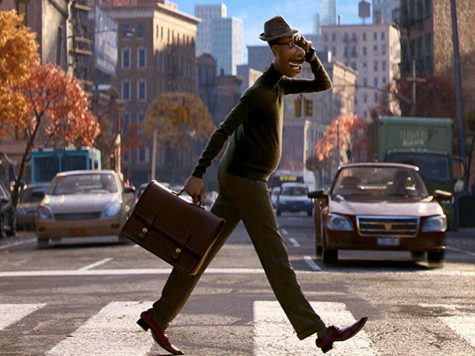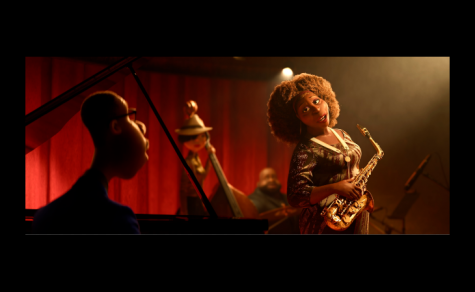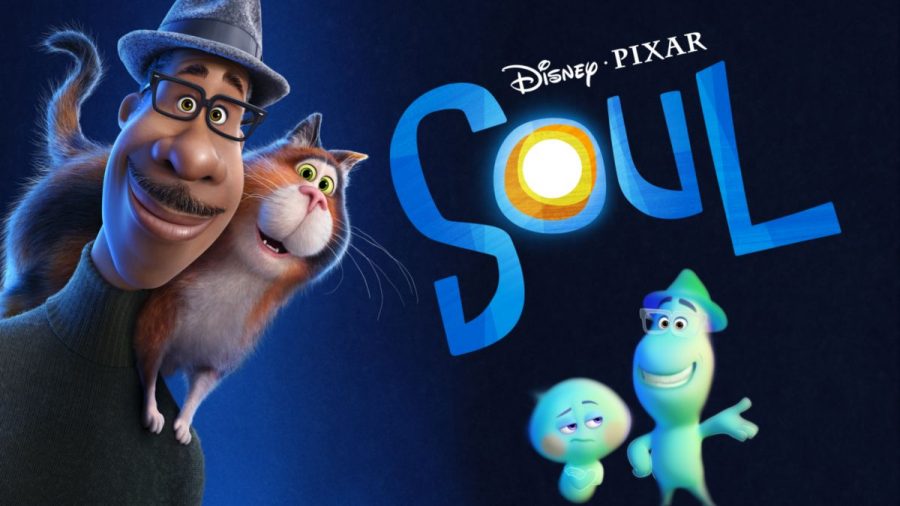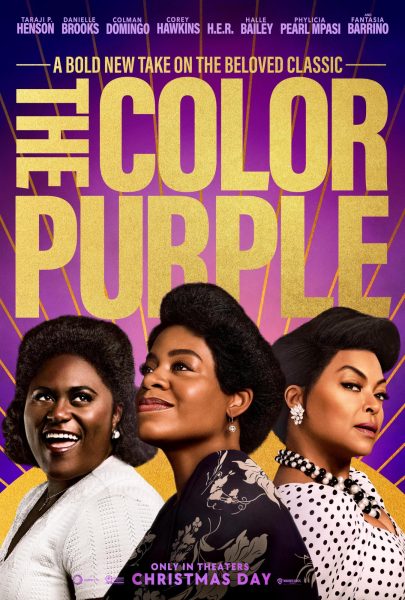SOUL: A GATEWAY TO THE AFTERLIFE
Photo courtesy of Disney Plus
Poster for the film that captures main character Joe Gardner and 22.
What happens after we die?
Typically, one falls to faith in order to answer this question, but no one really knows the reality until they confront death.
From the producers of Inside Out and Coco, Disney Pixar’s movie, Soul, explores the concept of the afterlife through the life of a black musician named Joe Gardner.
This movie stars actors Jamie Fox and Tina Fey, who voice the main characters Joe Gardner and 22. This film was released on Christmas day of 2020, and had already received high ratings such as a 96% from Rotten Tomatoes and a multitude of Best Animated Film awards in just the first few months of release.

The story of Soul takes place in the city of New York. Joe Gardner becomes a full time band teacher despite his aspirations to become a world renowned jazz musician. After getting a call from a former student of his, he is given the opportunity to perform with a well-known jazz band known as the Dorothea Williams Quartet. While he walks back home from work, he falls in a sewer and dies which transports him to the Great Beyond. This space-like vortex leads the souls of those who passed to a light that suggests a place of paradise.
“I guess it’s Pixar’s version of what heaven might be like, but it was absolutely incredible… so beautiful. It was also really neat, conceptually-speaking. No one knows for sure what happens when we die, but Pixar’s concept was enormous and majestic and soothing all at the same time,” reflects Gregg Greentree, Film Studies teacher, regarding the Great Beyond.
As Joe sprints away from the light, he eventually escapes the vortex, and enters the You Seminar. While being there, he meets 22, a soul who refuses to enter Earth and live life. Throughout this motion picture, Joe and 22 escape to Earth in order to reunite Joe’s soul with his body.
As the movie progresses, the concept of dissatisfaction plays as a recurring image in order to emphasize the idea that the smaller things in life are often taken for granted. Once the opportunity to cherish things like the ability to taste pizza or simply see a maple leaf fall from a tree is lost, one finally realizes the value of such privilege.
“I heard this story about a fish who swims up to another older fish and says…Young Fish: I’m trying to find this thing they call the ocean. Old Fish: The ocean? That’s what you’re in right now. Young Fish: This? This is water. What I want is the ocean,” orates Dorothea Williams.
“I learned to live life to the fullest and not wait for something to happen because then you’ll miss the present you’re living in,” states Isabel Yi, 12 when discussing the anecdote of the unsatisfied fish.
When reflecting about our own identity, we associate talent with purpose. Soul highlights that artistry doesn’t signify one has found his or her purpose, but rather, living life is one’s purpose. Although talents may be included in one’s life, it doesn’t equate to resorting to a single aptitude or comfort zone. Talent is rooted in passion that should remain for one’s whole life. This passion is seen in the perseverance Joe holds throughout the entire movie whether it was to get his life back or pursue a career in music.
Although Soul is notorious for its life lessons, a notable feature of this picture are its animations.
“I thought the animations looked amazing. There’s a scene where the main character is walking down a busy city street. There were signs on the buildings, people walking around, and cars driving by. It was so vibrant and colorful, just like a real city street is. It was shot from up high too, so you could really take in the entire scene. I just remember seeing it and saying ‘wow,’’ exclaims Greentree.
The detail in this film is executed in a way that isolates every factor of an image prior to combining and building the entire image. For example, the clothing of the characters reveal the fibers of the fabric like that of a wool sweater. The classroom is remarkable through the dirty green chalkboard, the poor lighting shining through the small windows, the shiny brass of a trombone, and the peeling paint on the wall. The details from the films reveal issues such as lack of funding in schools through poor infrastructure, as well as inequity in education for the black community.
Characters such as the barber, Dez, had always wished to become a veterinarian, yet this dream wasn’t attainable because of financial reasons and his adversities with starting a new family. This scene in the film, where Dez reflects about how being a barber was his only alternative, suggests that the lack of access to financial resources forces members of the black community to resort to technical jobs just to support their family. These reasons are caused by lack of funding being allocated to black communities.
“The progression in this film is a step in the right direction compared to the other films Disney has made. Platforms like Tik Tok have shown children of color being excited that the characters look like them, however, there are stereotypes that should not have been in the film. I would’ve liked to see black characters have greater jobs such as a business executive,” asserts Yi.

While this movie encourages the celebration of Black culture, it also contradicts this goal through devaluing the image of black females. When introducing characters such as Joe’s mother, she was seen as strict and unsupportive of his career. When introducing Dorothea Williams, a successful black woman, she is seen as judgmental and unapproachable which feeds into the stereotype that black women are aggressive, offending people who identify with this community like myself.
Although this movie has certain flaws in the celebration of the Black community, it serves as a paradigm for other productions to consider including people of color in films for younger audiences.
“Soul ended up being a perfect movie for right now. The COVID pandemic should make a lot of people take stock of their lives and reassess what they think matters. That’s the whole point of this movie. This guy didn’t realize what he had until he lost it, which is an especially timely message,” opines Greentree.
“There is a message in the movie for everyone, and it gives a very interesting perspective regarding the idea of an afterlife and living life as a whole,” declares Yi.












